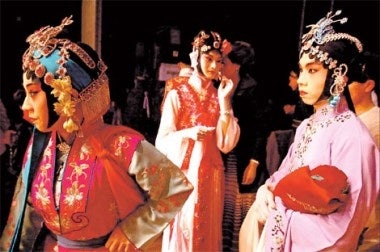Offshoot Of Peking Opera, Banned From 1950s-1980s, Still On "Verge Of Extinction"#

Last year, Jing Daily looked at the resurgence of Chinese traditional performing arts that were banned in the years following the establishment of the People's Republic in China in 1949 and have only been "rehabilitated" in recent decades. Since the early 1980s, many of these ancient art forms, from Kunqu to Nan Dan, have made comebacks in earnest, yet despite interest among younger artists and broader audiences, many in China worry that some of these art forms may be on the verge of extinction as remaining masters who learned their craft in the 1930s and 1940s retire or pass away.
Today, China Daily looks at one of these "endangered" art forms, Nan Dan opera, an offshoot of Peking Opera in which men play female roles. Despite the long history of Nan Dan opera, which was depicted in such films as Farewell My Concubine and M Butterfly and which reached its creative peak in the 1920s, practitioners must fight social perceptions that the art form is obsolete in modern society and apathy towards traditional culture among younger generations.
From the article:
Hu Wenge, 43, who is showing off his skills at the packed Chang'an Grand Theater, is one of fewer than 10 practitioners of the Peking Opera art form nan dan, in which men play women's roles.
Hu is the only nan dan apprentice of 76-year-old Peking Opera master Mei Baojiu and one of the last hopes for the future of the nearly extinct ancient performance style. Mei watches his student's 40-minute appearance from backstage, periodically nodding in approval.
Nan dan branched off near the roots of Peking Opera's evolutionary tree, during a time when women were banned from the stage.
It reached its heyday in the 1920s, with the rise of its four schools. Each of the Four Great Dan was named after the surname of its progenitor - Mei Lanfang, Shang Xiaoyun, Cheng Yanqiu and Xun Huisheng.
But nan dan was labeled as a "remnant of feudalism" in New China's early years, and practitioners were persecuted and even executed during the "cultural revolution" (1966-76).
The art form re-emerged after the opening-up and reform of the 1980s - but as a shadow of its former self.
"It's on the verge of extinction," says Hu, who studies the Mei school of nan dan.
"But we're still holding on for dear life."
...
[P]erformance hurdles aren't the only challenges these men face. With most dan plays performed by women, many question the validity of nan dan's existence.
"It's absurd to even talk about nan dan's legitimacy," the Cheng school performer Yang Lei says.
The art form was created by, and performed by, men, and the dan role was designed to suit the male physiology, the 32-year-old explains. Women performers later tried to fit into this mold, but the style hasn't come close to its apex at the time of the Four Great Dan, he adds.
"Male performers have better voices and longer career spans because of their physical advantages," he says.
Mu says actors must be in exceptional shape to stage a three-hour show, especially when the script calls for demanding martial arts stunts.
The Xun school performer Yin Jun points out that men pay greater attention to conveying femininity and consequentially have a more exquisite stage presence.
"Women playing women is life. Men playing women is art," the 22-year-old says.
Despite the best efforts of the few remaining Nan Dan masters in China, unless younger generations can become more interested in learning traditional art forms, many of them are likely to die off in the next few decades. Although interest in standard Peking Opera, or its Hong Kong and Guangdong counterpart Cantonese Opera, remains strikingly high among performing arts students in China, offshoots like Kunqu or Nan Dan will likely remain a difficult "sell" for the few remaining studios.